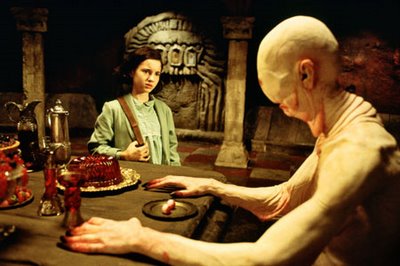
The Palm Springs International Film Festival (January 4-15), with a budget around $2.8 million, advertises itself as the fest “where star power and the cinema come together.” The order is significant. On opening weekend, this 18th edition and the fourth under director Darryl Macdonald hosted a meretricious gala at the Convention Center — replete with a video-clip homage to emcee Mary Hart of
Entertainment Tonight — saluting the canonized talents of the past year. These shining lights feasted with, and courted from the stage, 1,800 high-rollers — good PR for the studios as awards season commenced. Among the honorees were Kate Winslet, Jessica Biel, and the entire cast of
Babel (Brad, too), including Cate Blanchett, who, at just 37, received a career achievement award. The festival invited the L.A. film press, nearly all of whom returned home by the next morning with their Tiffany swag.
The following eight days comprised most of “the cinema” portion of the formula. Once the “star power” waned, so did the overall energy. Yet attendance, much of it reflecting the area’s retiree demographic, was good at many screenings of the 254 features. The program is a mixed bag — too many bad French films, for one — although the Cine Latino and Eastern European selections were a cut above. Scattered throughout the gala screenings, New Voices/New Visions (its jury awarded Argentinian Verónica Chen’s
Agua), Scandinavian sidebar, doc section True Stories, and World Cinema Now were many of the usual fest suspects, more than 20 LGBT features, and a plethora of so-sos.
What IS distinctive about Palm Springs is “Awards Buzz,” an Oscar preview section that includes 55 of the 61 submissions for Best Foreign Language Film — an opportunity to inspect some sort of barometer of last year’s worldwide production. Having viewed them as a juror, I couldn’t help but wonder how individual countries make their choices. Quality? Connections? Second-guessing the elderly Academy members who vote in this category? Better films were made last year in several of the represented nations.
Almost all of the movies that merited serious discussion had been discussed and validated during the past year (and were on the 9-film Academy shortlist announced mid-January), yet there were several fine films with less word-of-mouth: Romanian Catalin Mitulescu’s The Way I Spent the End of the World, Brazilian Marcelo Gomes’s Cinema, Aspirin and Vultures, Chilean Matias Bize’s In Bed, and Hungarian Szabolcs Hadju’s White Palms. The winner was, perhaps predictably, Guillermo del Toro’s Mexican entry Pan’s Labyrinth. Best Actor nod went to Mads Mikkelsen (Casino Royale) for Dane Susanne Bier’s marvelous After the Wedding, which IFC Films will release this spring, an astute, stunningly photographed study of an unusual ménage-à-trois set in Bombay and Denmark. Blanca Lewin took Best Actress for In Bed, a sizzling peep into a one-night stand shot in a single motel room.
As far as trends go, a number of the Oscar entries turned out to be about war, specifically war involving Muslims — not surprising in this post-9/11 era of global paranoia, terrorism, and American aggression. The value of Mohamed Al-Daradji’s Ahlaam, a mediocre Iraqi film that follows three inmates of a mental asylum before and during the U.S. invasion, lies in its graphic depiction of bombing, shooting, looting, and clueless American soldiers behaving insensitively toward locals. In a conventional movie about neighboring Afghanistan, Fyodor’s Bondarchuk’s disturbingly celebratory The 9th Company, Russia waxes nostalgic, in spite of the fact that it withdrew in defeat. The focus on the occupying soldiers’ solidarity and heroism fighting a faceless enemy is alarming.
Much more accomplished are Bosnian Jasmila Zbanic’s Grbavica: Land of My Dreams, which Strand opens in February, and Algerian Rachid Bouchareb’s Days of Glory, soon to be released by The Weinstein Company. Grbavica takes place in Sarajevo after the genocidal war by Bosnian Serbs against the Bosniaks (Muslims) over secession from Yugoslavia, yet that struggle is a hovering absence. Zbanic astutely observes the tense relationship between a single mother and the troubled 12-year-old daughter who is unaware that she is the product of her mother’s incarceration in a Serbian rape camp. Like Grbavica, Days of Glory is reality-based and addresses ethno-religious divisions. Bouchareb tells the story of a battalion of Algerian Arab soldiers who fought courageously in the Second World War to defend France, their “mère patrie.” French officers and the official bureaucracy treated them as second-class (non-) citizens. Worse still, the government later denied them their pensions. War is hell, but so is its aftermath.
Labels: Festivals
# posted by Webmaster @ 2/13/2007 02:23:00 PM
Comments (0)

